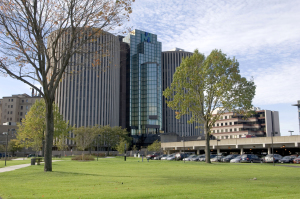A few weeks ago, I attended a Health and Sciences Research seminar about research in palliative care. I could easily translate this research into my personal experience, as I have had a loved one in the care of the Hospice of the Western Reserve since last fall.
Two things from that seminar struck me, and I have since shared this information with numerous people. The first is a study that the presenter, Dr. Maria Silveira, referenced during her presentation. It was a comparison of patients with similar prognoses in palliative care versus those treated with oncology. The study found that those in palliative care group lived longer than those treated with oncology.
At first these results seem counter-intuitive, but could hospice extend life because the services provided improve life’s quality? I have seen firsthand how the staff at the Hospice of the Western Reserve helped to make my father-in-law as comfortable as possible in all aspects—physically, mentally, emotionally, and spiritually. Hospice’s focus on quality of life relieved some of the stress from a difficult, painful experience. The journey has not been just about pain management, but acceptance of his transition into the afterlife.
He has recently made that transition. It is something that no person can completely prepare for, but the intervention and assistance of the staff helped greatly. I cannot emphasize how supported we felt by the hospice staff. They not only made him feel comfortable, but helped both him and his family greet his death with acceptance, as it was his opportunity to end his suffering. I have never seen death so normalized and accepted, and I know that without the staff of the Hospice of the Western Reserve, this inevitable experience would have been much more difficult.
The second thing that struck me about Dr. Silveira’s presentation is that palliative care is not available to all. While the availability of palliative care has increased dramatically in the last decade, there are still places where hospice care is not easily obtained. We are fortunate in the Cleveland area, as we have several available services. But there are still places, especially in the southern states, where this care is not available (For more details, visit http://reportcard.capc.org/pdf/capc-growth-analysis-snapshot-2011.pdf).
Everyone should have the choice to die with dignity with the support of trained, caring professionals who take care of the family as well as the patient. I have heard the main argument in support of palliative care is its cost-effectiveness, but its values are so much more than monetary. It is an opportunity have comfort, support, and improved quality at the end of one’s life.

